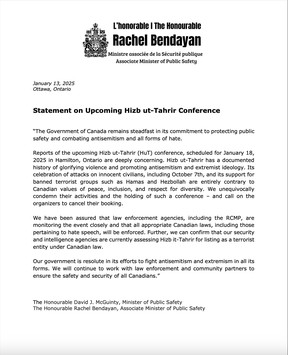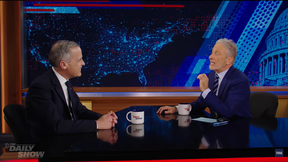TOP STORY
In his most explicit critique of his successor to date, former prime minister Stephen Harper said the government of Justin Trudeau has failed on basically every possible metric and has “denigrated” the country.
“All of the results of that government are bad; I mean virtually everything has been bad,” Harper told Florida-based podcaster Gabe Groisman this week.
On economics, Harper said “the damage is undeniable,” and he also accused Trudeau of pursuing a “woke agenda that has really denigrated the country’s culture and history and institutions.”
“I think Canadians have reacted more strongly against that than even the economic results,” said Harper.
Harper has made fewer than half-a-dozen media appearances since stepping down as prime minister in 2015 — almost all of them on U.S. conservative podcasts.
In 2018, Harper sat down for an hour with U.S. conservative broadcaster Ben Shapiro. In 2021, he was a featured guest on the podcast American Optimist hosted by tech investor Joe Lonsdale (who had hired Harper as a consultant).
In both of those, Harper delivered only veiled criticisms of the Trudeau government, saying he made it a point to avoid weighing in on the actions of his “successor government.”
In Harper’s 2021 interview with Lonsdale, he said only that Canada’s procurement of COVID vaccines would have happened much earlier under a Conservative government. “When we were in government, we never had any problem making sure we had vaccines well in advance,” he said.
Even in a 2023 keynote appearance at the Canada Strong & Free Conference, Harper’s only real critique of the Trudeau government was to say that it was on a “pretty poor course.”
But Harper’s interview with Groisman was different.
Right off the top, he accused Trudeau of misrepresenting himself as a centrist in the 2015 election that ousted Harper from power.
“He didn’t run as a far leftist; (he) tried to convince everybody that all the things they liked about our government would be maintained and a few things would be changed,” Harper said, adding “of course, the government then went to the far left almost immediately.”
He said Trudeau was never a particularly skilled politician, but clung to power thanks to a “media conglomerate” that “erased his every error” and “misrepresented his opposition.”
“It was literally propaganda … and that’s not going to be good enough anymore,” he said.
When Groisman asked if Trudeau’s downfall was a symptom of a global populist shift against left-wing incumbents, Harper said Canadians were turning on Trudeau for very specific reasons, rather than any kind of generalized distaste for progressivism.
Harper expressed his belief that “governments defeat themselves,” and that Trudeau had brought “totally dysfunctional government” to Canada.
“It isn’t just the economy, it isn’t just the anti-Canadian culture, but it’s also just that Canadian public services are not functioning properly,” he said.
While Harper gave credit to Conservative Leader Pierre Poilievre for leading the charge against the Liberal government, he added “Trudeau largely did it to himself.”
Harper also speculated on how the next few months would play out. He predicted that the new Liberal leader would be prime minister for “only a few weeks” before being forced to call an election that the party is virtually guaranteed to lose.
A Liberal victory “would require a miracle on their part, and some kind of disaster on (the Conservatives’) part,” he said.
Harper said Trudeau’s successor would be faced with the “Kamala Harris problem” — but worse. Harris, of course, was the Democratic nominee for U.S. president who attempted to run as a “change” candidate despite being an incumbent member of the Biden administration. Instead, voters picked her opponent, Republican nominee Donald Trump.
The next Liberal leader will have to go through a leadership race that will see them affirm their loyalty to the party and the record of the current government, only to immediately turn around and face an electorate that is unsatisfied with the status quo.
“The person’s in an impossible situation,” said Harper.
The interview also featured Harper being critical of U.S. president-elect Donald Trump. Specifically, Trump’s repeated public threats to annex Canada as the “51st state.”
At the start of the interview, Groisman framed Trump’s bluster as being a bid to destabilize the Canadian government and renegotiate the U.S. trade relationship with its northern neighbour from a “position of strength.”
Harper was far less sanguine, saying that Trump was wildly misrepresenting one of the United States’ closest friends and “shared comrade in the propagation of the values of the free and democratic world everywhere.”
“I must admit to being shocked by some of the things that (Trump) said; they’re just not so,” said Harper.
He focused in particular on Trump’s frequent claim that Canada’s trade surplus with the United States represents a subsidy.
Harper said the surplus exists because of large quantities of Canadian oil purchased by the United States at a significant discount due to Canada’s lack of alternative export options.
“It’s actually Canada that subsidizes the United States in this regard,” said Harper.
On the issue of border security, Harper said there’s no real migrant crisis on the U.S. northern border, and that far more “guns, drugs, crime” were entering Canada from the other direction.
He also expressed bafflement with the notion that Canada needs to step up its defence of the North American continent. Harper said the U.S. participates in alliances such as NORAD to ensure the “defence of the United States.”
“Do you want Canada to be a neutral country?” he said.
“I have a real problem with a lot of the things that Donald Trump is saying; it doesn’t sound to me like the pronouncements of somebody who’s a friend, a partner and an ally,” he said.
IN OTHER NEWS
The race to succeed Justin Trudeau as Liberal leader has only just begun, and it’s already yielded one catastrophic faceplant. On Tuesday, former B.C. premier Christy Clark officially announced that – after months of learning French and declaring herself a “lifelong Liberal” – she had actually decided not to run for Liberal leader. It might be related to the fact that the first major act of Clark’s prime ministerial bid went down in flames last week. In an interview with CBC, she laughed at claims that she’d ever been a member of the Conservative Party – only for the Conservatives to immediately confirm that she became a member in 2022.
-

This was the public letter put out by Rachel Bendayan, the Associate Minister of Public Safety, in response to plans by the radical Islamist group Hizb ut-Tahrir to hold a conference in Hamilton, Ont. Advertised as the Khilafah Conference, its aim was to discuss plans on how to conquer Southern Europe, North Africa and the Middle East and transform it into an authoritarian Islamic empire governed by sharia law. Early Tuesday morning, Hizb ut-Tahrir announced they’d scrapped the idea.
Conservative Leader Pierre Poilievre said this week that if the Trump administration hits Canada with tariffs while he’s prime minister, he would retaliate. “I would say to President Trump ‘I will retaliate with trade tariffs against American goods that are necessary to discourage America attacking our industries,” Poilievre told Victoria, B.C.’s CHEK News. Poilievre also said that Trump’s repeated threats against Canada were a signal that Canada should export its oil to more non-U.S. markets, and increase interprovincial trade to reduce reliance on cross-border trade.
-

Former central banker Mark Carney kind-of, sort-of announced his official candidacy for the Liberal leadership this week – and he did it in front of a New York City TV audience. “I am an outsider,” Carney said in an appearance on The Daily Show with Jon Stewart. Stewart, in turn, compared Carney’s prime ministerial bid to the campaign of failed U.S. presidential candidate Kamala Harris. “Run. When I say run, I mean not for office. I mean f–king run, the other way,” said the host.
Get all of these insights and more into your inbox by signing up for the First Reading newsletter here.

